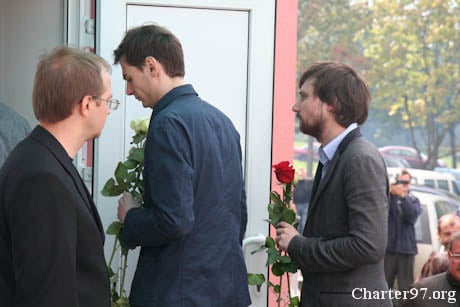Index relies entirely on the support of donors and readers to do its work.
Help us keep amplifying censored voices today.
Microsoft is extending its program of giving free software licences to non-profit organisations. The initiative was first applied to Russia, after it was discovered that authorities were using software piracy inquiries as a method of suppressing independent media outlets and advocacy groups. The program will now include 500,000 NGOs in Armenia, Azerbaijan, Belarus, Kazakhstan, Kyrgyzstan, Tajikistan, Turkmenistan, Uzbekistan, China, Malaysia, and Vietnam. Prior to the announcement NGOs could only obtain a free licence if they were aware of the program and followed the necessary procedure. According to Microsoft’s official blog announcement, the unilateral licence will last until 2012.
 The unsolved case of Ukrainian journalist Georgiy Gongadze highlights concerns for press freedom in post-Soviet states
The unsolved case of Ukrainian journalist Georgiy Gongadze highlights concerns for press freedom in post-Soviet states
(more…)
The Belarusian authorities have said that the Organisation for Security and Cooperation (OSCE) will be granted access to the investigation into the death of Aleh Byabenin (Oleg Bebenin).
This article originally appeared in the Independent
I landed in Minsk, the capital of Belarus, last Friday to meet the journalist Aleh Byabenin [Oleg Bebenin] and other civil society activists. On Monday I attended Aleh’s funeral.

One of Belarus’s leading journalists, he had been found hanged in his country home earlier on Friday. His beloved 5 year old son’s hammock was around his neck, hung so low that his feet touched the ground. Andrei Sannikov, of the human rights group Charter 97, the organisation Bebenin co-founded, was one of the first at the scene. He has grave doubts about the coroner’s suicide verdict. “No suicide note was found, and his last SMS to friends showed they planned to go to the cinema.”
Byabenin’s associates suspect foul play and talk through tears about a man who devoted 15 years to fighting President Aleksander Lukashenko’s dictatorship, and was in no mood to quit. In hushed tones everyone fears a return to the period between 1997–99 when activists, business and journalists suddenly “disappeared” without trace.
In the past year, human rights activists have faced continual intimidation from the authorities. On 6 December 2009, Yahen Afnagel, a youth leader, was kidnapped in broad daylight on the streets of Minsk and taken by van to a forest just outside the city. His hands were bound together and a bag placed over his head. He told me he was subjected to a mock execution and that men screamed at him that it would be carried out for real if he continued to question the authorities. In just two months, 6 youth leaders faced mock executions.
All of this is happening, today, on European soil. When the Italian Prime Minister Silvio Berlusconi visited Minsk last November he told President Lukashenko that his people “love you, which is shown by the elections”.
Never mind that the Organisation for Cooperation and Security in Europe (OSCE), of which Italy is a member, declared that the previous presidential election” failed to meet OSCE commitments for democratic elections.”
Realpolitik is the order of the day, and the opening up of markets by the IMF and the World Bank are paying dividends for businessmen and their political cronies in capitals across Europe. Britain is no better. Lukashenko’s government is said to be “in discussions” with Grayling, a PR firm owned by Lord Chadlington, one of David Cameron’s closest allies. Lord Chadlington clearly has few qualms dealing with the dictator of a nation ranked 188 out of 195 countries for press freedom; where every gay club has been shut down, and where Lukashenko has personally approved the turning of Jewish holy sites into multi-storey car parks.
Culturally, too, Western artists are helping to soften the image of Belarus. This month Sting will perform a concert in the Minsk Arena. While Sting performs, the banned Belarus Free Theatre will perform “Discover Love” in an abandoned house on the other side of Minsk, their play about the abduction and disappearance of businessman, democrat, and foe of Lukashenko, Anatoly Krasovski. Unlike the audience at the approved Sting concert, those attending performances of the Belarus Free Theatre are subject to harassment by the KGB.
And while Europe ignores the plight of the Belarussian people, the dictatorship is intensifying its efforts to stifle dissent. The KGB and intelligence forces are developing more subtle ways to target opponents. Opposition figures are accused of being Scientologists or threatened with criminal libel proceedings. Yesterday an anonymous comment on the Charter 97 website read: “We will wipe all of you off the face of the earth. None of your relatives will ever produce the like of you again.” The site’s moderator, Natalia Radzina has recently received emails and text messages that say: “We will rape you,” followed by her address.
The case of Aleh Byabenin should ring alarm bells across Europe. We cannot let Europe’s politicians sleep walk into a cosy accommodation with a tyrant. Belarus is Europe’s shame.